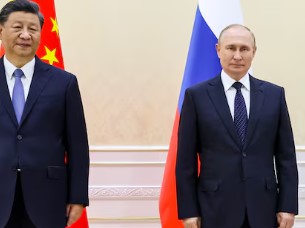China and Russia often call each other close friends and partners. Their presidents—Xi Jinping of China and Vladimir Putin of Russia—have publicly said that their relationship has “no limits.”
A Friendship with Hidden Spying Tensions
They have stood together on many global issues and even praised each other’s leadership. But behind the scenes, spying and mistrust have quietly entered the picture, making things not as friendly as they seem.
After Russia invaded Ukraine in early 2022, something surprising happened. According to reports from The New York Times, Chinese hacker groups started targeting Russian companies and government offices as part of a larger spying effort. These were not ordinary hackers. Experts say they were backed by China’s government and were very skilled at what they do.
By May 2022, just months after the war began, these cyberattacks increased. At the same time, the two countries were still showing their friendship to the world. This raised eyebrows among cyber experts who began looking deeper into what was really going on.
One of the major reports came from a Taiwanese cybersecurity company called TeamT5. In 2023, they found that a Chinese hacker group named “Sanyo” pretended to be part of a well-known Russian engineering company. Their aim? To gather intelligence about Russia’s nuclear submarines—extremely sensitive and secret military information.
China’s Spying Reveals Lessons From Russia’s War
China’s military is known for having advanced weapons and technology. But many Chinese military experts admit they don’t have much real battlefield experience. Watching Russia’s war in Ukraine gave China a chance to observe modern war tactics, how weapons are used, and how the West responds in combat.
This makes Russia a sort of “live classroom” for China. But learning from a partner by watching is one thing—trying to secretly take their military data is another. That’s what alarms experts and officials.
A secret document from Russia’s FSB (Federal Security Service), Russia’s internal security agency, shows that Russia is growing suspicious of China. The document, shared with The New York Times, even calls China an “enemy” and accuses it of stealing Russian military secrets. This is shocking, especially since Russia has never said anything like this publicly. Out in the open, Russia still acts like nothing is wrong.
The document says China is interested in Russia’s defense technology and wants to learn from how it operates in Ukraine. This includes spying on Russia’s biggest military companies.
Military Targets and Malware Tools
One of China’s main cyber targets is Rostec, a powerful Russian government-owned defense company. Rostec deals with satellite systems, radar, and electronic warfare tools. According to the New York Times, a Chinese state-supported hacking group tried to steal information from Rostec to learn more about these technologies.
Another cybersecurity firm, Palo Alto Networks, explained that these hackers used fake Microsoft Word files. When someone opened the files, it would allow the hackers to sneak into the computer systems and access sensitive data. These types of cyber tricks are often hard to detect and can be very dangerous.
Itay Cohen, an expert at Palo Alto Networks, pointed out that the war in Ukraine has changed the type of intelligence that both Russia and China seek. The battlefield has now expanded into cyberspace.
In 2023, another Russian cybersecurity company, Positive Technologies, reported even more attacks. These cyber intrusions affected Russian companies in the aerospace field, private security firms, and parts of the defense industry. A special kind of computer virus called Deed RAT was used in these attacks.
What makes Deed RAT unique is that it’s not available to regular hackers. Chinese government-backed hackers are believed to have created and used this secret tool. Unlike most other malware, hackers do not sell Deed RAT on the dark web.
Even before the Ukraine war began, Chinese hackers were caught spying on Russia. Back in 2021, they reportedly targeted Russian companies involved in building submarines. This shows that the spying didn’t start with the war, but it may have grown much worse since then.
While China and Russia continue to act like strong allies in public, the facts suggest that behind the scenes, a silent cyber war is unfolding. These events reveal a much more complicated relationship—one where trust is under pressure, and secrets are under attack.
